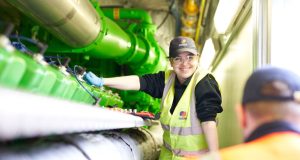A new report which has been presented to Parliament today by the Climate Change Committee (CCC) states that only a third of the emissions reductions required to achieve the country’s 2030 target are currently covered by credible plans.
This news comes against the backdrop of a more positive story – that the country’s emissions are now less than half the levels they were in 1990, largely due to the phase out of coal and the ramping up of renewables. However to continue to decarbonise the UK, CCC says we will now need to see “ambitious action not just in the energy sector, but also across transport, buildings, industry and agriculture”, adding the plans in place from the previous Government will “not deliver enough action”.
Professor Piers Forster, Interim Chair of the Climate Change Committee said: “The country’s 2030 emissions reduction target is at risk. The new Government has an opportunity to course-correct, but it will need to be done as a matter of urgency to make up for lost time. They are off to a good start. Action needs to extend beyond electricity, with rapid progress needed on electric cars, heat pumps and tree planting.
“The transition to Net Zero can deliver investment, lower bills, and energy security. It will help the UK keep its place on the world stage. It is a way for this Government to serve both the people of today and the people of tomorrow.”
The Committee has written a priority list of 10 recommendations in its 2024 Progress report to Parliament. Top among these are to make electricity cheaper, reverse recent policy rollbacks, and ramp up rates of tree planting and peatland restoration.
Much of the low carbon technology needed is already available, says CCC, yet almost all indicators for the scale up and roll out of that technology are off track, with rates needing to significantly ramp up. The report states by 2030:
- Annual offshore wind installations must increase by at least three times, onshore wind installations will need to double and solar installations must increase by five times.
- Approximately 10 per cent of existing homes in the UK will need to be heated by a heat pump, compared to only approximately one per cent today.
- The market share of new electric cars needs to increase from 16.5 per cent in 2023 to nearly 100 per cent.
In response to CCC’s annual report, Yselkla Farmer, CEO of BEAMA, the UK trade association for energy infrastructure and systems said: “The Climate Change Committee is strongly reinforcing a message that has been clear from UK’s Net Zero supply chain for many years – without decisive action and policy certainty, the country will not only fail to deliver on our decarbonisation commitments, but we will lose the global race for investment, skills and materials.
“The Government has a clear mandate to accelerate electrification and pursue green economic growth. The Committee’s report calls for a significant increase in heat pumps, removing policy barriers for consumers wanting to make a Net Zero choice and a greater focus on the supply chain. BEAMA members are ready to invest and grow the market for the clean technologies of the future that will decarbonise our homes, businesses and transport. Scaling up this supply chain for heat pumps and EV charging infrastructure will take time, so the sooner the UK Government re-commits to clear targets, the more affordable and achievable they will be.”





